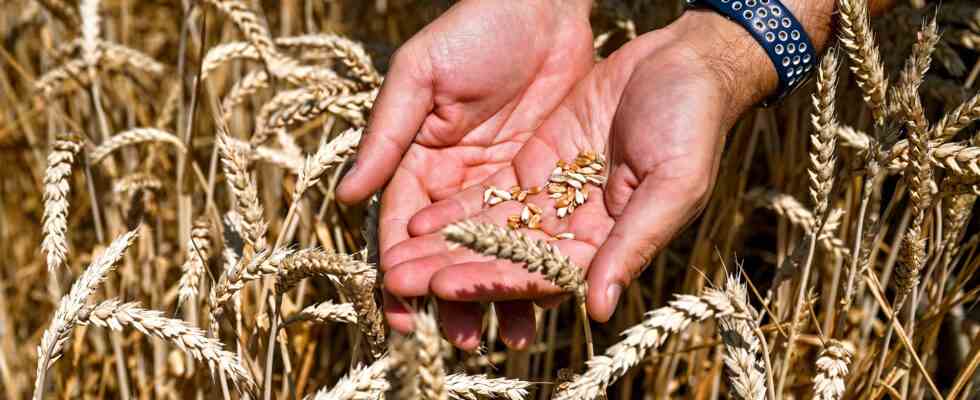FAQ
Status: 11/17/2022 4:24 p.m
Russia has agreed to extend the grain deal. This means that the export of Ukrainian wheat across the Black Sea is secured for the time being. Why is the agreement so important? And why was she on the brink?
A few days before the Ukraine grain agreement expires, the agreement, which is important for global food exports, was extended. The agreement reached in July with Russia and Ukraine, brokered by the United Nations and Turkey, will be extended by 120 days, all parties have confirmed. Until recently, it was uncertain whether Russia would stay on board.
Why is the agreement important?
Russia and Ukraine are considered the breadbaskets of the world. The two countries provide food for much of the world – together they export almost a quarter of the world’s grain. That changed with the Russian war of aggression. Fields could no longer be cultivated, granaries were destroyed and the Black Sea ports, through which most of the wheat is exported, were suddenly inaccessible.
As a result, food prices, which were already high, skyrocketed, exacerbating hunger crises in economically poorer countries. Experts warned that the worst famine after the Second World War was imminent. More stable countries like Bangladesh, Egypt and Turkey also import 60 percent of their wheat from Ukraine and Russia. In order to alleviate the global hunger crisis, the world community pushed for an agreement after the start of the war that would allow grain exports from Ukraine.
What’s in it?
Nothing has changed in the original agreement. With the mediation of the United Nations, Russia, Ukraine and Turkey have agreed on a so-called grain corridor for the next four months, in which a ceasefire applies. The ships therefore enter Ukrainian ports empty, but are checked beforehand in Turkey. The responsible coordination center in Istanbul is staffed by representatives of the four parties. The main purpose of the inspections is to ensure that ships do not have any weapons loaded – that was important to Russia.
The empty ships are loaded with food in Odessa or the neighboring ports. On their return, they have to stop again in Istanbul and undergo another inspection. Russia also benefits from the agreement. The country subject to international sanctions may also export food and fertilizer.
What has the agreement achieved so far?
Since the beginning of August, the agreement has allowed more than 11 million tons of grain and other agricultural products to be transported on 462 ships from Ukrainian ports. About 40 percent of this went to developing countries. According to its own statements, the UN World Food Program alone shipped almost 300,000 tons of grain for starving people via the Black Sea corridor.
In addition, the Black Sea Corridor enables grain donations to other countries. For example, the federal government announced that it would support a Ukrainian wheat donation to Ethiopia. Germany is financing the ship transport with 14 million dollars – the equivalent of around 13.5 million euros, said Federal Minister of Agriculture Cem Özdemir (Greens) to the newspapers of the Funke media group. The grain donated by the government in Kyiv could feed 1.6 million people in the country for a whole month.
However, the agreement appears to have only a minor impact on global food prices. Since the signing, prices have fallen only slightly, data from the UN agricultural organization FAO shows. They are still above the level of the previous year.
Why was the “Black Sea Grain Initiative” on the brink?
Until recently, Russia had left open whether it would agree to an extension. Two aspects are particularly important to the Kremlin: the agreement must not be used by Ukraine for military purposes, and it cannot only apply unilaterally. Russia must also have the opportunity to export food.
Moscow feels hampered by Western sanctions in its own exports of grain and fertilizer. Although the sanctions do not target food exports, their existence makes it difficult for Russian actors to call at European ports, process payments and obtain insurance for their ships. The UN and Turkey are committed to solving these problems.
How is the global community reacting?
Politicians and NGOs were relieved. The agreement mitigates the global food crisis. “The Black Sea Corridor is a lifeline for the 349 million acutely hungry people in the world,” said Martin Frick, head of the Berlin office of the World Food Program (WFP) of the United Nations.
Cautious diplomacy has contributed to a multilateral solution, said UN Secretary-General António Guterres. The UN would continue to support the Turkish coordination center, which is tasked with ensuring smooth transport. “The United Nations is doing everything it can to remove the remaining barriers to exports of food and fertilizer from Russia,” Guterres said.
Ukrainian Infrastructure Minister Olexander Kubrakov spoke of an “important step in the global fight against the food crisis”. The Russian Presidential Office also confirmed the extension of the agreement. However, Kremlin spokesman Dmitri Peskov explicitly referred to the UN’s commitment to ensure that the export of Russian food and fertilizers is also guaranteed. The USA, Great Britain and the EU have declared that they will not sanction these exports. This is progress and work is underway to completely remove the remaining obstacles.
Warning words came from the German Federal Development Minister Svenja Schulze. Despite the extension, “viable alternatives” would have to be found. The past few weeks have clearly shown that one cannot rely on the word of Russian President Vladimir Putin, said the SPD politician. Dependence on grain imports in partner countries must be reduced.

